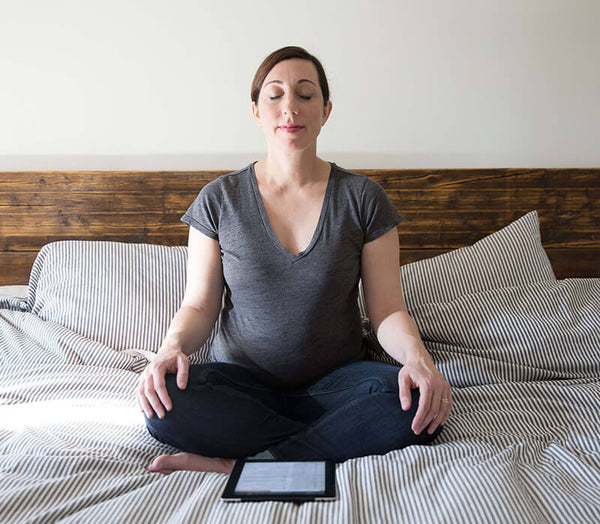Why Science Is Telling Us To Meditate During Pregnancy

We’ve partnered with Expectful, to provide you with science-backed advice about how meditation can improve your physical and mental well-being during pregnancy and as a new parent. Anna Gannon is a Yoga and Meditation Guide who writes and works for the digital platform. Her mission is to improve women’s emotional health during their fertility, pregnancy and new motherhood experience. Anna explains why science has been telling is to meditate throughout pregnancy, and the health benefits it has.
You can also listen to a FREE meditation session from Expectful at the end of this post. Helping you to achieve a more positive state of mind.

The day I found out I was pregnant was the happiest and scariest day of my life.
I experienced a rollercoaster of emotions, from anticipation to anxiety, to love and fear, to a sense of adventure and a ton of uncertainty. The one thing that brought me comfort was knowing that when I saw my doctor he would be able to ease my worried mind and assure me that my baby was OK.
During my doctor’s visit, he prescribed me a prenatal vitamin, gave me the number of a nutritionist, talked to me about how to approach exercise and sent me on my way.
When I left his office, I expected to feel relaxed and at ease, but instead, I felt anxious.
And as my pregnancy continued, so did my worry.
I stressed out for weeks before getting an ultrasound, I doubted my food choices, fearful that I would eat something that could harm my baby, and I struggled tremendously to stay calm every time my baby went a while before kicking again.
When I shared my concerns with a friend, they recommended I try an app that helps with guided meditation during pregnancy.
 I was hesitant, but I signed up to see if it could alleviate some of my stress and help me to better manage all of the uncertainty during pregnancy.
I was hesitant, but I signed up to see if it could alleviate some of my stress and help me to better manage all of the uncertainty during pregnancy.
Initially, I couldn’t tell if it was doing anything, but after a few days, I noticed I felt more energetic. A few days after that I was felt more relaxed, and within 10 days I felt like a whole new person.
With each passing day that I meditated, I could feel my stress and anxiety fade away. All the concerns I had previously didn’t hold as much weight anymore, and instead, I was able to see things in a more positive light. This not only affected the way I looked at myself but the way I connected with my baby and husband as well.
Each day I practised meditation, I became closer and closer to the life growing inside of me and those moments till this day are some of the most memorable of my entire pregnancy.
Just as exercise kept my body feeling strong during pregnancy, meditation helped my mind stay healthy, focused and energized. Just as my prenatal vitamin supplied me with the nutrients and minerals my body needed, meditation gave my mind the ease and self-confidence I had yearned for.
Meditation transformed my pregnancy, which left me wondering, why my doctor never spoke to me about my emotional well-being during such an important and challenging time?
After experiencing these positive shifts due to meditation I became curious as to how meditation directly benefits pregnancy. So I looked into the research and what I found made me realize that meditation was doing a lot more than just ease my uncertainty, it was also giving my baby a better start in life.
 Below are the benefits I found:
Below are the benefits I found:
1) Reduced Risk Factors. There’s no doubt that meditation helped to reduce my stress and anxiety but at the time I had no idea that it was also helping to protect my baby as well. Research shows that high levels of stress and anxiety increase risk factors during pregnancy (1), and by keeping cortisol levels low(2), I was giving my baby a better environment in which to grow.
2) More Likely To Go Full-Term. A study that explored preterm birth found that women who participated in a mindfulness training program were 50% less likely to give birth early than women with no mindfulness education (3). I believe my meditation practice played a role in helping me to give birth just two days shy of my due date and helping my baby to be born with a healthy birth weight.
3) Less Pain During Labour. A study of a group of people who attended a four-day mindfulness meditation training found that they were able to decrease the intensity of a painful stimulus by 40 percent (4). Not only was pain reduction due to meditation a helpful tool during birth and labour for me, but it was also beneficial during my pregnancy and recovery when Annabell needed me more than ever.
4) Better Immunity. I somehow never got sick during my pregnancy or postpartum period. However, this made complete sense to me after I learned that meditation enhances the body’s immune function (5). Staying healthy not only kept my body strong during pregnancy, but it also protected my baby, too.
After reading all the science behind meditation and how beneficial it is during pregnancy and new motherhood, I came to the conclusion that as a society we are missing one key factor when it comes to pregnancy and postpartum: meditation.
Based off of my personal experience and the research behind how meditation can support a women’s pre and postnatal journey, that we start a bigger conversation around women’s emotional health during this transformational time of their lives. It’s my hope that within the next few years that when women walk into their doctor’s office looking for the tools that can support them, that meditation is right in line with prenatal vitamins, nutrition, and exercise.
You can listen to a FREE meditation visualisation from Expectful - helping you to feel your absolute best during pregnancy!

About Expectful
Are you pregnant or new to motherhood?
Expectful is a digital platform that makes meditation easy for expectant and new moms. Each one of our guided meditations has been created to support you throughout your pregnancy and motherhood journey.
Our mission is to help you give your baby the best start in life. Go to expectful.com and sign up for our free meditation trial.
References:













